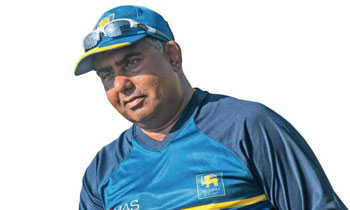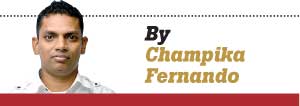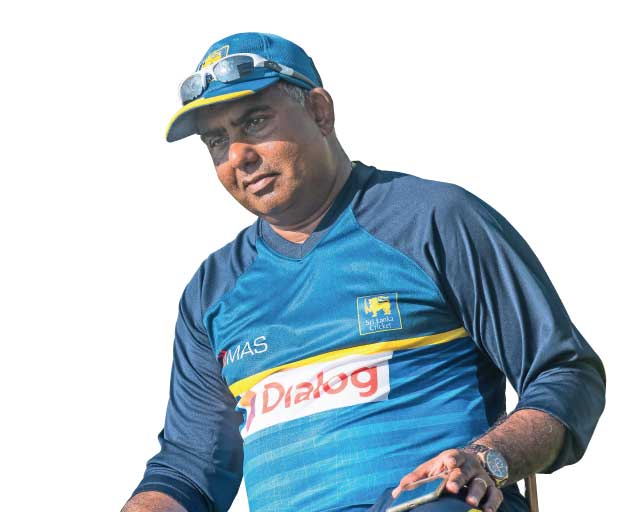Reply To:
Name - Reply Comment
 Sri Lanka Cricket recently appointed Asanka Gurusinha, a member of the 1996 World-Cup- winning team as the Cricket Manager in a bid to help the transition of the national team.
Sri Lanka Cricket recently appointed Asanka Gurusinha, a member of the 1996 World-Cup- winning team as the Cricket Manager in a bid to help the transition of the national team.
 Sri Lanka Cricket recently appointed Asanka Gurusinha, a member of the 1996 World-Cup- winning team as the Cricket Manager in a bid to help the transition of the national team. In an exclusive interview with Daily Mirror, Asanka domiciled in Australia for about two decades since leaving Sri Lanka soon after the World Cup triumph speaks of the challenges faced by him as manager, the national team and also what forced his premature retirement from cricket.
Sri Lanka Cricket recently appointed Asanka Gurusinha, a member of the 1996 World-Cup- winning team as the Cricket Manager in a bid to help the transition of the national team. In an exclusive interview with Daily Mirror, Asanka domiciled in Australia for about two decades since leaving Sri Lanka soon after the World Cup triumph speaks of the challenges faced by him as manager, the national team and also what forced his premature retirement from cricket.
Q It has taken you two decades to return to Sri Lanka and give something back to the game. What prevented you for so long?
It is an interesting question that has been asked on several occasions. Nothing held me back. There were quite a few times that they approached me during the past 15 years to fit me into different posts. And I thought this is the right time to return and do something. I think Sri Lanka Cricket is on the right track. That doesn’t mean it was not on the right track earlier but I think with lot of good people in the support staff and in good positions within the SLC, for instance Sanath Jayasuriya as Chairman of Selectors and Aravinda de Silva as Cricket Committee Chairman. I played so much of my cricket with those guys. So I thought this is the best time to come and work with them and give something back to Sri Lanka Cricket.
Q You said there have been several calls earlier but you never took up the challenge. What is so impressive about the current set of officials that convinced you to take up such an important post?
Like I mentioned, it was because of Aravinda, Sanath, the current selection committee and all those guys I played with. So to me it’s much easier to work with guys whom I have worked with and whom I can trust and communicate with easily. We don’t have arguments or anything. I can pick up a phone and call Sanath and talk and give my opinion about team selection. I think that’s the good thing for me. I am not talking about the board as such. Sri Lanka Cricket has done a lot of changes for the good.
Q What can you do better than what the others in the support staff have not done to take this young team forward?
I am not saying I have miracle cures or anything like that. But about working with these guys. I think they are talented, the skills and everything is there. It is just that sometimes they are tweaking a little bit, because you can get into a semi-final but to get to a final and win, you need that extra experience or extra planning. I think one area that lots of people have been talking about is mental toughness and that is something I plan to concentrate on. Mental toughness is a big word and it’s not an easy thing. We got to look at some activities that the players can do so that they can build on it. You cannot put on a switch and say that you are mentally tough.
Q When Sri Lanka won the World Cup in 1996, we only had a coach, a physiotherapist and a manager but right now there are too many backstage players in the side. Do you think it’s really necessary for a team?
I think the game has changed a lot from the time I retired when you look at the amount of cricket they play -- I mean the three formats of the game. If someone actually plays all three formats, he doesn’t actually have a break. So a support staff to look after these players is really important. Most of the support staff may not have a role to play during a game, but their job begins when the game ends. We got a masseur to make sure the players are ready for the game on the next day while the physio’s and trainers are there to make sure the players are fit enough. You cannot do major fitness sessions since they are playing so much cricket but they are looking at recovery and rest. Those are the reasons they are in the team with different coaches for fielding, bowling and batting (we do not have one for batting). It’s just specializing. It’s a professional job now.

Q There is a well-known cliche that says, ‘too many cooks spoil the soup’. Don’t you think having too many backstage players may impact adversely on the team?
I don’t think so. It may have an adverse effect. That’s where the important part comes in. How you strategize and plan it and hold everyone accountable is what finally matters. It’s not just the players who have to be held accountable but it applies to the support staff needs as well. That’s what we will be implementing slowly with Fordie (Graham Ford). Ford and I will work very closely with each other to look at what the bowling coach will do on a certain day and what he will achieve from that session. We are going to be very specific. As I said this is just my third day. I will sit with Fordie and work out the kind of strategy to make sure that we are being very, very specific. That’s what happens these days. The coaching is very specific now. You go to a net and you see people practicing the reverse sweep and that’s where I feel it’s good to have coaches. Your question is pretty good and we need to put them on the right path and make them accountable for that.
Q Could you elaborate on your role as the Cricket Manager?
It’s working and coordinating with the Selection Committee, the Cricket Committee, the Coach and the Team. I will work very closely with Fordie and the team, looking and strategizing, looking and analyzing and most probably I will start analyzing from next week for the Champions Trophy. So that Fordie can focus not with the Test match going on and I can do all that analyzing for Fordie to make sure that we are on the right track.
Q You were a brilliant No. 3 batsman in the bygone days. After that we had Kumar and then we have Kusal Mendis increasingly proving to be a good No:3 bat? Could you explain the traits of a good No:3 batsman?
I think the number three position is really different to every other position. In some games you will walk to the middle in the first over or might stay in the dressing room for a couple of sessions. So mentally you have to be ready to switch on and switch off very quickly and then go and play according to the situation. Normally the No. 3 is expected to bat for a longer time and is the backbone of the game so that stroke-makers can go around him. The difference with Sanga is, he’s a legend. He was more aggressive and I don’t think anybody I have seen can come close to him as a No. 3.
Q Soon after the 1996 World Cup, you decided to quit and migrate to Australia. You were just 30 then. Looking back do you think, you made that decision too early?
When I look back I don’t think so. I know I was young, I was just 30-years-old when I quit playing international cricket. I don’t have any regrets. That time I had to make a call, looking at my future, my family and I don’t have any regrets. I think I did the right thing then, because I suffered some injuries and had a few other things happening. So no regrets.
QApart from the injury that you mention, what else really forced you to take that decision?
That’s something that lots of people don’t know. At that time the Sri Lankan Cricket Board and I weren’t seeing eye to eye. They were making it very difficult for me to keep playing the game. When you don’t enjoy the game, you need to walk away from it. It was tough as I said to make that decision. I don’t think anybody knows when to retire. It was a tough call and when I wasn’t enjoying the game, I thought I should walk away and get someone else to do that. I will not keep any grudges and all those people are still my friends. I had to respect them for the decision they made at that time because they were the decision makers. I had to respect that even though I did not agree.
Q Had it not been for that, where do you think, you would have ended up in cricket?
If I played without retiring I would have definitely played the 1999 World Cup who knows I would have captained as well.
Q If you can recall the role you played in the 1996 World Cup final which set the tone for our victory?
I don’t think it’s just the World Cup final but it was actually the whole process that started a couple of years back with Dave Whatmore coming in as coach. My job at that time was to make sure that I bat as long as possible at one end, because we had so many stroke-makers coming from Sanath, Romesh Kaluwitharana, Aravinda, Arjuna, Roshan and all those guys. With all those stroke-makers on one side, the plan was for me to bat right through on the other side. So we can build it. That’s exactly what I kept doing till I retired.
Q How was your relationship with your captain Arjuna Ranatunga? The reason why I asked was because of a known fact that he had a say in your early retirement?
Very good. I don’t blame anybody for my retirement. At the end of the day I made that decision. Arjuna and I are very close friends and I still talk to him regularly. When he once came to Melbourne he stayed with me as well. The ‘96 World Cup team was a closely knit unit. We had lots of reunions during the past three or four years and we were a very good unit when we carried the team banner in 1996.
Q Looking at the future what are the areas we must improve and change to be a force to be reckoned with at the 2019 World Cup?
To win a World Cup, you need to do everything right, which is not easy. There are so many teams who want to be perfect and one area in any tournament is fielding. You cannot miss any catches. I will not accept anybody who says ‘he tried’. At that level you got to take it. You got to take run-outs, you cannot miss it. You must make sure that every ball you throw hits the stump and results in a run-out. Fielding will make the difference in the 2019 World Cup in England. Yes it will be played in England and the ball will move a little bit but I don’t think that’s going to be a major issue because if you take the catches and the run-outs you can even defend 250 runs.
Q Champions Trophy is just three months away but we are still to find the right player combination. Do you think we can be a team to be reckoned with in England?
Absolutely. The three one-dayers against Bangladesh will be a starting point for us. That’s what we want to do to make sure that we have stability going forward. At the same time there’s a responsibility for the players as well. They need to make sure that they do their job well and keep performing. Performance will come when you do the right thing. So there’s a job for everyone and that’s pretty much I have as Cricket Manager to get that strategy going.
Q Kusal Mendis played a brilliant innings yesterday. As a No. 3 batsman how do you analyze his innings and do you think he is in for greater success in that position?
Absolutely. He has got a bright future. This is not the first time, he got a big hundred. He got a big one against Australia. As team manager I will have to consult the selectors to guage whether he needs to play T20 for a while. Sometimes it is better to keep him away from the T20’s and play him in one-dayers and Tests and build him up to a higher level. Right now he is compelled to switch from one format of the game to another very quickly, it’s a bit tough. I don’t want to get him used to the T20 format of cricket only where he plays a variety of shots.
Q Do you support the idea of having a separate T20 team just as most teams in the world?
I will always support that. It’s something I will seriously look at with the selectors and the team management. Also with the board, because for something like that I’ll have to work with the Executive Committee and look at what we can do. If you want to do well consistently in T20 cricket, we will have to have a separate team for T20.
Q There was also a discussion on introducing a split captaincy -- one captain for Tests and the ODIs and another for the T20s? Do you support such a move?
I think a lot depends on the player. Take Angelo. He can hold his position in any XI. But I think Angelo will make a call probably pretty soon on what he wants to do. From what I have seen in the past of players of Angelo’s calibre, many have given up T20’s to focus on One-Dayers and Tests. I think people like Michael Clarke did that. Steve Smith is still playing T20 but I doubt whether he will play that longer. Angelo as a player and a captain will make a decision when he is ready. Angelo is more important to Sri Lanka cricket for Tests and One-dayers. That’s my opinion.
Q Even though we have been a tough team to beat at home, we have struggled under foreign conditions? Where do you think is the problem?
Is it our club cricket system or the spin-friendly surfaces? Look we can sit here and talk about club cricket and pitches. But I think Sri Lanka Cricket is on the right track, playing with lot of foreign teams. There’s England-A team is here. We have a U-19 team playing and an emerging team going to Bangladesh. I feel that’s the best way to improve and get this young guys to play overseas a lot more or even with good teams. Because if we keep depending on the club structure, to change and do things differently we will be left behind in world cricket. That’s something I really like about Sri Lanka Cricket. They are focusing a lot on young people to play outside Sri Lanka. For instance the U-19 team is going to Australia in April, that’s unbelievable for these young guys. But the importance is not just to go on a tour but to have a plan and a goal and gradually achieve our targets.
It’s not about winning at this stage but about developing a player. I hope we can have U-19 players walking straight in to the national team, the same way we did -- Aravinda, Arjuna, Roshan and myself, we all walked straight from school to play for Sri Lanka. That’s what I want to achieve and that will be the happiest day of my life, if I can see that happening within the next 12 months.